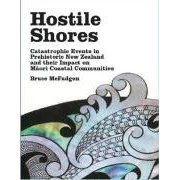McFadgen Bruce
Bruce Mcfadgen has been an archaeologist in New Zealand for over 45 years. His areas of interest include radiocarbon dating and the impact of tectonic dating in New Zealand culture, and he is currently employed by Victoria University in Wellington and is working on many projects there. He has published over 70 academic papers and texts, his most notable contribution being his Stout Fellowship under which he published Hostile Shores, about the impact of natural disasters on early Maori civilization.
Contents
Early Education
Before becoming an archaeologist, Mcfadgen became qualified in surveying by working for the Department of Lands and Survey until 1968, after which he finished his bachelor’s and master’s degrees in Anthropology.
Awards and Credits
He initially came to Victoria University to receive his PhD in Geology in 1979. His first position as archaeologist was working for the Historic Sites Trust of New Zealand until 1987, during which time he received the ILFORD award for Aerial Archaeology in 1982 and was president of the New Zealand Archaeological Association (1986-1988) and also the Wellington branch of the Royal Society of New Zealand (1985-1987). As a member of the Royal Society, he has served on the Skinner Research Fund Committee since 1987. From 2001 to 2004 he was on the Advisory Board for the National Isotope Center. He then became employed as a scientist by the Department of Conservation, before retiring early in 2003 to begin work on his Stout Fellowship. He has since become the editor of the New Zealand Surveyor, a New Zealand publication by the Institute of Surveyors.
Stout Fellowship
The Stout fellowship was established by the John David Stout trust in order to sponsor research projects into the society of New Zealand, and is an independent grant to well published and recognized scholars to research for a full twelve months at Victoria University. In 2003, he received the Stout fellowship for his research on tectonics and the Maori people, upon which he worked at the Stout Research Center. It was during this time that he researched and wrote his book Hostile Shores: Catastrophic Events in Prehistoric New Zealand and their Impact on Māori Coastal Communities. It references many studies, from his independent archaeology to the oral storytelling tradition of the Maori, and focuses on not only early volcanic activity on the islands of New Zealand but also the rash of 15th century tsunamis and their effect on the early populations.
Hostile Shores
One NZ Foundation Controversy
There has been some controversy among the One New Zealand foundation, which claims to refute Mcfadgen’s work with evidence of pre-Maori settlement in the New Zealand Islands. The ONZF, however, is a society of some debate as an anti-Maori, protest group opposed to the government of New Zealand’s actions in settling with the Maori people. One of their main publications targets Mcfadgen several times, describing his work as “dismissive and simplistic”, however as a private group their findings have not been largely credited.

